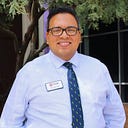Understanding language leads to healing of community
In America, we say “God willing.” In Mexico and other places, they say “si Dios quiere.” The phrases mean the same thing but they sound different.
When you live in the borderlands, or in any community where two worlds come together, people say the same thing to each other but different words are heard, different syllables, different inflections of tone.
The same words are being said but our brains think we are hearing something different. When we hear something different, understanding becomes more challenging. Communications begin to break down.
We get confused. A simple greeting, a raised eyebrow, a questioning face, leave us going from a place of wanting to hear something, to a place of wanting to go separate ways.
It happens all the time, misunderstanding. On our side of the border we expect others to speak our language. We use collective words that pit groups against each other. Us, we, here, you, them, there. Maybe other cultures do it too. We want people to be like us, to sound like us, because we think it’s the best way to be, to sound.
Growing up in a bilingual household, I didn’t know as a kid that there was a correct way or a better way. My parents taught me that everyone spoke English and Spanish. As a teenager, I began to think that my…
